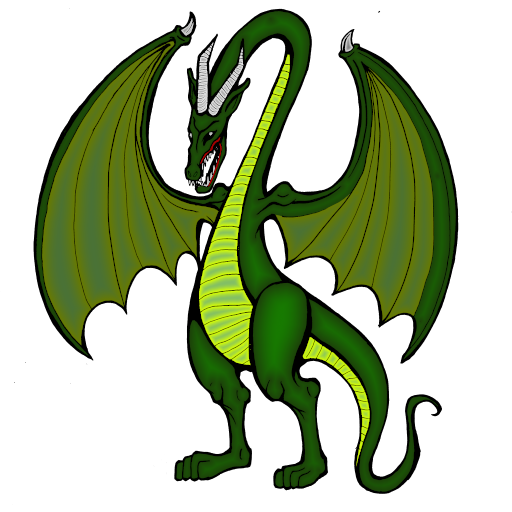When OgreWare gave me the list of creatures I’d be drawing for the Calling All Heroes roster, almost all of the were familiar to me from the many fantasy books I’ve read over the years; however, the Wyvern had me stumped. I didn’t even know what a wyvern was at first, and Google seemed to just show me dragons. Of course, a quick call to OgreWare taught me that a wyvern is basically a smallish dragon with no front limbs – its front “limbs” are actually its wings – and that they’re actually pretty common in fantasy fiction.

I grew up on fantasy and sci-fi fiction, so I’m not sure how I managed to somehow miss wyverns entirely. I remember loving Patricia Wrede’s Dealing with Dragons and other books, and then Madeleine L’Engle’s Time quintet; later, Tamora Pierce was my idol as a fantasy writer. Still later I got into Jim Butcher’s Dresden Files. And, of course, I can’t skip over the fact that my dad read The Lord of the Rings aloud to me and my younger brother, before the movies came out, “so that you can get it all clear in your head before Hollywood ruins it” (his words).
On the sci-fi side, I’ve always loved Ray Bradbury and Isaac Asimov’s works. I also am a great believer in Douglas Adams’ Hitchhiker’s Guide to the Galaxy, and the value of its slightly sarcastic, wonderfully irreverent approach to science fiction. Dune was incredibly inspirational to me. And I read Fahrenheit 451 every year and it scares me a little more every time (because the passing years seem to bring us closer to that world).
Nowadays I’ll read anything that’s got a good fantasy or sci-fi bent, but my favorites are the things that throw fantasy, sci-fi, and a good story into a blender and just make it a free-for-all of advanced technology, magic, and yes, even wyverns. A couple of current favorites are Cloud Atlas by David Mitchell and Half Life by Shelley Jackson (not related to the video game franchise). Both are weird and wonderful examples of fantasy-sci-fi books that break as many rules as they please in the name of telling a good story – and come to think of it, they both break a lot of rules in format as well as storytelling style. (Half Life, especially, includes things like diagrams, lists, and scribbles on napkins, mixed in with text in its pages.)
Breaking rules as you please in the name of telling a good story: That’s kind of the Ogre spirit that guides us here at OgreWare. OgreWare has always been in the business of making good games, and I’m all about telling a good story.
Rules be damned.
If you’d like to see a sample of OgreWare’s work, you can play the current version of Calling All Heroes – click here to play in your browser, or here to download the .apk file for your Android device.
Until next time,
Taylor